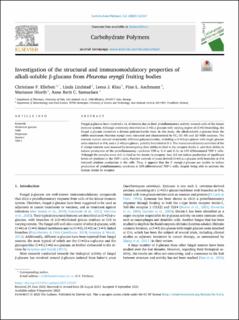Investigation of the structural and immunomodulatory properties of alkali-soluble β-glucans from Pleurotus eryngii fruiting bodies
Ellefsen, Christiane Færestrand; Lindstad, Linda; Klau, Leesa Jane; Aachmann, Finn Lillelund; Hiorth, Marianne; Samuelsen, Anne Berit C.
Peer reviewed, Journal article
Published version
Permanent lenke
https://hdl.handle.net/11250/3116014Utgivelsesdato
2023Metadata
Vis full innførselSamlinger
Sammendrag
Fungal β-glucans have received a lot of interest due to their proinflammatory activity towards cells of the innate immune system. Although commonly described as (1➔3)-β-glucans with varying degree of (1➔6)-branching, the fungal β-glucans constitute a diverse polysaccharide class. In this study, the alkali-soluble β-glucans from the edible mushroom Pleurotus eryngii were extracted and characterized by GC, GC–MS and 2D NMR analyses. The extracts contain several structurally different polysaccharides, including a (1➔3)-β-d-glucan with single glucose units attached at O-6, and a (1➔6)-β-d-glucan, possibly branched at O-3. The immunomodulatory activities of the P. eryngii extracts were assessed by investigating their ability to bind to the receptor dectin-1, and their ability to induce production of the proinflammatory cytokines TNF-α, IL-6 and IL-1β in LPS-differentiated THP-1 cells. Although the samples were able to bind to the dectin-1a receptor, they did not induce production of significant levels of cytokines in the THP-1 cells. Positive controls of yeast-derived (1➔3)-β-d-glucans with branches at O-6 induced cytokine production in the cells. Thus, it appears that the P. eryngii β-glucans are unable to induce production of proinflammatory cytokines in LPS-differentiated THP-1 cells, despite being able to activate the human dectin-1a receptor.

